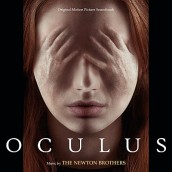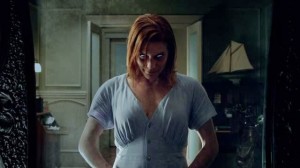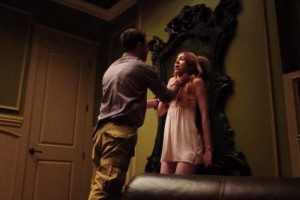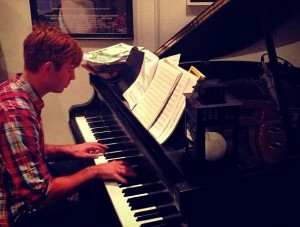If it can be said that a mirror captures the soul of its beholder, than OCULUS is a repository second to none in terms of maliciousness and murder – a glasswork fit for any evil queen, or ghostly demon for that matter. Encompassed by ornately Gothic woodwork, this titular mirror has slowly, psychopathically made mincemeat out of its owners through the centuries, most recently claiming a suburban mother and father to madness – not to mention making life sheer hell for their surviving children Tim and Kaylie Russell. Now, this brother and sister are determined to pay back this malevolent antique, coming up with a plan to finally destroy the mirror and reclaim their sanity. However, their good intentions are about to stem no small amount of bad vibrations from OCOLUS‘ musty surface.
While bonded by music as opposed to actual blood, the work of The Newton Brothers casts a truly chilling and hypnotic spell over OCOULUS. While resonating with a pulse-motif that signals the film’s sinister glasswork, the Newton’s OCOULUS is far more about a creepily soothing thematic power that gradually sucks in its intended victims in, as opposed to the shattering shards of dissonance that comprise many horror scores of the day. Weaving a tragic sense of childhood lost that’s given birth to screwed-up adulthoods that must be vindicated at any cost, OCOULUS resonates with creepy string lines, tragic themes, ghostly voices and subsonic musical effects that seemingly cry out from another dimension. Yet there’s a singularly elegant creepiness to this music, and movie, as befitting a chiller whose slow-burn build seems positively ornate. For filmmaker Mike Flanagan has effectively made sure that OCOULUS takes its sweet, gripping time bringing on the orchestral-jumping shocks, deliberately crafted storytelling that’s helped the Newtons make for a horror score that’s as melodically enjoyable as it is scary.
The fact that OCOULUS is positively, subtly old-school in its creepy construction is maybe the most shocking thing about the decidedly unconventional alt. score work of the non-sibling team of Andy Grush and Taylor Stewart, whose unconventional talents have risen them through the indie likes of the zom-com WASTING AWAY, the terror of Pauly Shore (ADOPTED) and surreal crime drama (MAGIC MAN) to memorably play the teacher-in-hell movie DETACHMENT, all before creating what’s likely the most bizarre southern score of all time with the Gothically rock-warped “Pawn Shop Chronicles.” But it will truly be OCOULUS that gives the Newton’s their biggest exposure yet for what’s sure to be another insanely advertised Blumhouse horror hit – the first of the numerous, stylistically differing projects to come for the the duo, an IMDB list that includes the Elmore Leonard adaptation LIFE OF CRIME, the Tourette’s-afflicted relationship drama THE ROAD WITHIN and the opportunity to become a trio with Danny Elfman for Flanagan’s next nightmarish horror film “Somnia.”
Yet whatever the subject, the Newton Brothers are catching Hollywood’s ear with influences ranging between Elmer Bernstein and Nine Inch Nails, creating a sound caught in an enticing netherworld that uniquely straddles rock, traditional and experimental film music with such instrumental choices as kazoos, wine glasses and club beats – making for a singularly unquantifiable voice that’s surprising with ever-impressive results, especially with a work of captivating, relative saneness that transmits the unnerving, yet very listenable power of OCOULUS.
ASSIGNMENT X: Was there a point where you simultaneously decided to become musicians?
ANDY GRUSH: For me, I grew up around my Uncle Dennis who played piano for a living. STAR WARS blew my mind when it came out. In the midst of taking classical piano lessons, he showed me how to play the STAR WARS Main Titles cue on the piano. I could only sketch out the melody and chords, but that was the beginning for me.
TAYLOR STEWART: When I was a little kid I remember watching “ET” for the first time. There was this overwhelming sensation of adventure and magic on screen. At first I wasn’t sure why I was feeling so emotional about ET dying or escaping in the chase sequence. Later I realized it was the combination of music and visuals that so impactful. That’s when I decided I wanted to be involved in film and music. But I had no idea how.
AX: Taylor, could you talk about apprenticing with Hans Zimmer, and what “tools” the experience gave you to break out on your own?
STEWART: I wasn’t there very long. But the experience taught me a ton. The two most valuable lessons I learned had to do with the business of film scoring and finding that tune or theme. The business side of things is what ultimately allows your career to grow. Just writing music alone isn’t enough. You’re dealing with people, collaborating, sharing ideas. With themes I learned simplicity is key. It can be a very complex piece. But at the heart it’s simple and hopefully memorable. Paying attention to both of these elements at all times is not always easy, but my time at Remote Control taught me to strive for both, no matter what.
AX: What was it like working with the alt. score duo Tomandandy on THE MOTHMAN PROPHECIES and RULES OF ATTRACTION, a movie that yielded the track “Later Guy?”
GRUSH: That was a great experience for me. Both were very involved and challenging. There were a few of us constantly working to develop themes, tones, sounds and textures. We worked for many months tracking tons of musicians and sounds to create just the right score for each of those films. Not every film calls for a standard approach to scoring. More often than not nowadays, computers and digital tools are new instruments that can be employed quite creatively in tandem with classical elements. These two films were my first taste of that.
AX: A score of yours that first caught my ear was for Tony Kaye’s excellent, unsung high school drama DETACHMENT. Could you talk about working with such a controversial director?
STEWART: Thanks! Tony is an incredibly talented individual. He’s always trying to be creative in every sense of the word. We were brought on board through the producers. At first Tony was a bit hesitant with us, but after he started hearing the music, things changed for the better and he warmed up. We had about two weeks on DETACHMENT. It was a hectic schedule. It was one film I stopped sleeping half way through the scoring process to meet the deadline. But Tony was constantly calling us giving his musical ideas, suggestions. It was great.
AX: An especially insane score of yours was for Wayne Kramer’s PAWN SHOP CHRONICLES. Could you talk about that collaboration?
STEWART: Wayne’s a sweetheart. He’s quite a connoisseur of film music. We were under an incredible time crunch on that film and we were playing a majority of the instruments ourselves so we were always up against the clock, but the score was so much fun. Wayne really pushed us to write something gritty, dark and fresh. That part I loved. We just manipulated the hell out of traditional southern instruments.
AX: OCULUS is your first major foray into the horror genre. Did any past scores, or films influence your approach? And what kind of music scares you to begin with?
STEWART: The original version of THE THING and POLTERGEIST were scores that influenced us. JAWS scared the hell out of me growing up. I couldn’t even take a bath.
GRUSH: Jerry Goldsmith did such an incredible job with POLTERGEIST. That score bled fear, intrigue and haunt, everything to compliment the story of that film. I think music that scares me is music that speaks to something unseen on the screen. The mind is powerful, and music will spark anyone’s brain to visualize something that may or may not even be real. In “Oculus,” there was a steady evil building under the story. It was so much fun to spend time working out those ideas.
AX: Do you have any frightening childhood memories? And if so, did you want to put them into the score?
GRUSH: I have a recurring nightmare that a wolf is on an adjacent hill chasing me. Sounds dumb, but it scares the crap out of me. I don’t know that I incorporated that into the score, but I definitely thought about that same fear as we worked through many weeks of a long scene in OCULUS in which young Kaylie is being chased.
AX: OCULUS grew out the director’s short film. How did he want the music to give it a cinematic feel this time out, and what was your collaboration like?
STEWART: I think he just wanted it to be as fitting as possible. Not only is Mike an incredible director/writer, but he’s also a gifted musician and quite humble about it. We had a great time going over ideas with him. Originally he wanted the score to be more tonal. But I think once we combined the orchestra with the synths and samples it really brought it to that cinematic level and gave it it’s own identity.
GRUSH: The cinematic feel evolved even more as we got into writing the score. On the surface, the film was terrifying and underneath, there is a lot of great story driving all that’s happening, so we wanted to expand musically as much as we could.
AX: How difficult is it to make a mirror musically scary?
STEWART: It’s not too difficult. I think that is the brilliance of Mike Flanagan. He filmed it in such a way that it’s mysterious and disturbing without music. Once we added the sound palette, orchestra and bass, it became quite foreboding, creating a feeling that this evil was emerging.
AX: How did you create pulsing “mirror motif?” And how did you want to make it both sonically apparent, yet “transparent” at the same time, as if calling out from another, evil dimension?
GRUSH: We combined to two bass sounds and an Oscar synth and Zebra. We automated this with two types of distortion. Then it was sent through a bit of tremolo and a gate so we could control the beats per minute separately from the session. If you listen you’ll hear the bass at moments speeding up and slowing down independently of everything else.
AX: OCULUS is also possessed with any number of interesting samples and sound design elements. Could you talk about them?
STEWART: Without completely geeking out, I can tell you that we spent about 3 weeks recording different sounds then processing them through different effects and software. “Meta Synth” was a favorite. Sheet metal, broken glass, cymbal scrapes and ambient white noise were the bulk of it. We also pitch shifted the orchestra up and down, which was usually doubled with synths.
GRUSH: I will also try not to nerd out too much here as well, but it was really fun getting the orchestra and solo instruments synced up with Ableton Live, then tweaking the metal, glass, scrapes and ambient white noise. Tuning them, turning them into drones, creating rhythms. Add a quad espresso to that process and I can be left alone for weeks.
AX: What glass-like qualities did you want the score to reflect?
STEWART: Andy and I talked about reflection early on. We tried string harmonics and actual glass being bowed and scraped. But detuned, processed cymbal and sheet metal scrapes is what we used a majority of the time to hint at the mirror’s reflection.
AX: Could you talk about keep a balance between melody and dissonance, one that’s pointed more towards melody? And on that note, do you think there are too many horror scores now that are relying on dissonance over the subtlety, and melody that make OCULUS stand out?
STEWART: I’m big fan of melody driven scores. I grew up on them. I like walking out of a theater humming a tune. I push for that in all our scores wherever possible. But unfortunately it’s not always appropriate and is not what’s requested, or should I say the popular vote. Luckily Mike was open to us sneaking it in. Obviously dissonance has to be present, especially in a horror film. But I think the balance was on the emotion of the characters. That’s typically where we inserted melody. That’s what we used as the gauge for the balance between dissonance and melody… emotion.
GRUSH: In general, yes. I wish I heard more of it. But it really depends on the film. I’ve heard plenty of horror scores devoid of melody and it was incredibly effective. I just think when everyone does it, it loses its effectiveness. Dissonance is generally uncomfortable.
AX: Was it refreshing to use far more of an orchestral approach on OCULUS than your past scores?
STEWART: Definitely. It was refreshing. We have a couple films we’re doing this year that will rely even more on the use of orchestra.
AX: OCULUS takes an unusually slow-burn approach, fairly “classic” approach to unraveling its horror. How did that play into the development of the score?
GRUSH: It allowed us to establish the two opposing views of the mirror. So the audience doesn’t really know whom to believe early on. It also gave us time to establish the emotion of the characters. Kaylie is a rather strong character that has something to prove. Tim, on the other hand, just accepts the horrible tragedy and is more delicate. But they have this bond… they care about each other. These are all things we took into consideration.
AX: Another quality that makes OCULUS stand out is its how the horrific events of past and present blur into each with increasingly surreal effect. How does the score contribute to that?
STEWART: We tried accomplishing that in a couple ways. We wanted certain sounds to be associated with certain elements, like the dead plants. We had a sound specifically for dead plants. We also had synths and the orchestra pitch bend and gliss into the next scene, which helped make the music feel dreamlike at times.
AX: OCULUS has a feeling of sadness, and tragedy that’s palpable. How did you want the score to get across that empathy for Tim and Kaylie?
STEWART: Personally that’s one of the things I loved the most. I think the lush string sound with shaky pads underneath really helped accomplish that. It gave it a sweetness with a sense of instability. They had this horrible thing happen to them, and you feel for the characters
AX: How did you want to convey the idea of children caught up in Oculus’ evil?
STEWART: We had elements of bells and piano in a few cues to hit the childlike moments when we felt it was appropriate, and of course choir towards the end.
AX: Did you want those voices to represent the idea of a heavenly afterlife, or how the mirror is essentially lying to lure in its victims?
STEWART: It’s more about the incredible loss that the brother encounters. We really wanted to hit that emotion. He was still just a little boy and if you mess with The Mirror, bad things happen. But I like your perception of it. I think everyone will have their own take on what the chorus does.
GRUSH: At some point in the scoring process the idea of a lullaby came into the mix. The use of the chorus helped achieve that while also giving a very real and human sensibility to the characters.
AX: It’s no easy task to turn a horror theme into a catchy song, but you’ve done so with Paul Oakenfold for “Oculus of Glass.” How hard was it putting an alt.-Goth beat to the melody?
STEWART: Thanks we tried. It was a little tricky. Paul did his remix that plays at the end credits. Then we kind of expanded upon his idea with “Oculus of Glass.” Greta has such amazing voice. She’s singing in Icelandic, most people don’t know what she’s saying which adds a bit of creepiness.
AX: You’ve got another horror movie up right after this called PROXY. What can you tell us about its score, and how it differs from OCULUS’ approach?
STEWART: It’s completely different, much more traditional in every sense of the word. I think we only used synths for one character. The rest is primarily string and woodwind driven. I’ve never seen a film quite like it. It’s truly unpredictable.
AX: How do you think OCULUS fits into the “Blumhouse” brand of horror in terms of its movie, and score, yet stands outside of it?
STEWART: Well, technically it is a horror film. It’s very unique though. It focuses more on story and characters. Rather then just scares. It has layers and makes you think.
GRUSH: Scorewise, with many horror films you get a lot of noise, synths, drones, and creepy piano. It’s become almost predicable. Although there is a time and place for that stuff. But for OCULUS we wanted to add as much live instrumentation as possible and combine it with the synthetic to create a hybrid score.
STEWART: I definitely could see it becoming a franchise. It’s a solid concept and story. I think there’s room to grow. They could get into the History of Mirror. How it came about. But the score could be expanded upon as well – though it’s hard to say which way without having a script!
STEWART: It’s hard to say. I think it’s important in any profession to distinguish yourself from your peers. I think people will be more surprised as time goes by how much our scores vary.
GRUSH: I think our range stylistically gives us a bit of an edge over others. But then again I think it could be a downfall when trying to be known for a certain style. The collaboration between the two of us really forces us to push our ideas early on. It’s always easy to pull back on those ideas and rein them in, but we literally talk about pushing boundaries every time we start a new film. I’ll never forget a film we did where a woman was being vivisected and the director asked us to score the background of the woman being cut apart and not the act of being cut apart. We mocked up two versions, a “bloody horror” version and a version with a melancholy cello playing a sad melody. We played the solo cello version first and we were terrified that the director was going to kill us for trying this. He loved it and it made it into the final cut of the film.
AX: How do you solve any internal creative conflicts that might come up?
STEWART: We’re both brutally honest with each other. I think we both inspire each other to write better, which always helps. If we both have different viewpoints on a theme or idea, we’ll just present multiple choices to the director. We really don’t have too many conflicts.
GRUSH: It’s important that we don’t stifle one another. I don’t think either one of us is afraid to throw something at the other to get feedback. You can’t make another person or an audience like or love a piece of music. It works or it doesn’t.
AX: Would you say you’ve had a musical game plan together since the beginning? And if so, where are you hoping it will take you in Hollywood?
STEWART: I would say we’ve had game plan since we’ve been working together. I’m a strong believer if you do something you love and can make a living off of it, you’ve already made it. I hope we continually get to work with directors we love and projects that were excited to do. That’s the focus.
AX: Finally, what’s your advice on how to break that damn mirror?
STEWART: I’m pretty sure it won’t let you.
GRUSH: There’ve been a lot of earthquakes here in LA lately. Maybe they should hang the mirror there?
The Newton Brothers’ score available on Varese Sarabande Records now digitally HERE, and on CD April HERE
Visit The Newton Brothers’ website HERE
LET YOUR VOICE BE HEARD – COMMENT BELOW!
Follow us on Twitter at ASSIGNMENT X
Fan us on Facebook at ASSIGNMENT X
Article Source: Assignment X
Article: Interview with composers the Newton Brothers on OCULUS
Related Posts:














